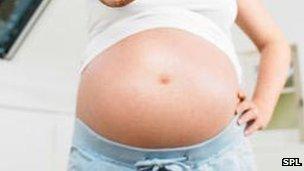Teen pregnancy rate lowest since 1969
- Published

Pregnancy rates in under 20s are going down, but there has been a sharp rise in the over 40s
The teen pregnancy rate in England and Wales has reached its lowest since 1969,new data, externalshows.
Figures from the Office for National Statistics show conceptions in under-18s fell to 34,633 in 2010 compared with 38,259 in 2009, a drop of 9.5%.
Pregnancies in under-16s also went down - by 6.8% to 6,674 in total from 7,158 the previous year.
But the pregnancy rate overall increased, as more women in their 30s and 40s are now having babies.
The overall conception rate for 2010 was 82.3 per thousand women, up from 80.9 in 2009, a rise of 1.7%.
The sharpest rise occurred among women aged 40 and over, rising by 5.2% to nearly 30,000.
This rate has now more than doubled since 1990.
Conception rates also continued to rise among women in their 30s.
Experts say the trends might be driven by the economic recession.
In tough financial times, family may be valued more highly and, as parents could be out of work, they may have more time to spend on child rearing.
But others, like women in their early 20s, may delay having a family due to financial concerns caused by the recession.
High rates continue
Julie Bentley, chief executive of FPA, said the decline in teen pregnancies was to be welcomed.
"The fact that we're seeing the lowest teenage pregnancy figures in England and Wales for over 40 years is because of the dedicated work of professionals in relationship and sex education, contraception and local services. We must do all we can to keep the momentum going," she said.
A spokesman for the Department of Health said: "It is encouraging to see teenage pregnancy rates continuing to decline. They are now at their lowest level for over 40 years.
"However, we still have high rates compared with many other western European countries. That is why we are giving local councils ringfenced public budgets and the power to build healthier communities."
Labour, who were in power when the drop occurred, said it was proof that its strategy of working to improve sex education was successful and should continue.
The Royal College of Midwives said it was concerned that pregnancy rates overall are still rising.
"We are not seeing midwife numbers keep pace," a spokeswoman warned.
- Published28 February 2012
- Published9 August 2011
- Published22 February 2011